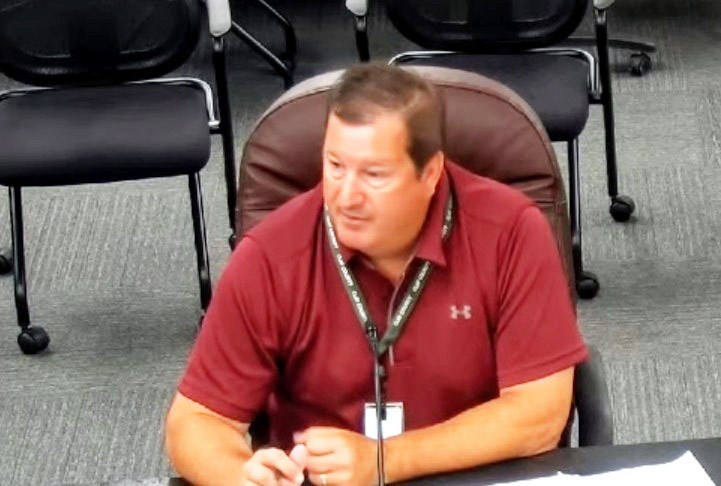
Clay County Engineer David Overbo
Karen Newman
Seeking Clay County’s approval for substantial change orders in funding for Clay County’s CSAH 8 (County State Aid Highway 8) project, County Engineer David Overbo provided a lengthy explanation of unexpected problems remaining from the project. Water saturation complicated attempts to pave a section of road involved in CSAH 8, significantly increasing the cost. The county board ultimately approved the change orders after Overbo clarified the extent of the problems the construction crew encountered.
Overbo explained, “Last summer (2020) we started work on the project. Initially it was supposed to be basically just a paving project where you grind up materials to re-lay those down and lay new asphalt on top of it.” He explained that in July, about 7000 feet of road bed wasn’t setting up. In consultation with the Minnesota Department of Transportation (MNDOT), alternative fixes to dry it were proposed and unsuccessfully attempted:
· Opening the road up and disking the materials underneath.
· Trenching down the middle of the road and filling with asphalt millings
· Digging French drains
When the alternative fixes didn’t work, the crew dug down a few inches with a spade. The hole filled with water almost immediately. Overbo said, “There was just so much water in the subgrade.”
By August, 2020, knowing that beet harvest was fast-approaching, Overbo said, “We decided to roll the dice and try to pave it.” Although about 80% of the 4.5-mile project was successfully surfaced, the middle 7000-foot section did not stand up to the equipment working and driving on it, ultimately leading to a dangerous one-way construction zone shared by equipment, highway truck traffic, farm trucks, and other vehicles through the Fall 2020 harvest season.
The County Highway Committee conducted initial test borings which didn’t indicate the extent of the water issues. Summer 2020 rains an added to the saturated subgrade. The committee and Overbo consulted with departments in other counties about setting up guidelines for change orders so that departments and county boards may be notified in a timely manner about costly, unexpected issues. Overbo explained that when state gas tax dollars are used for projects, MNDOT oversees them, requiring approval by MNDOT for changes over $50,000 to be sure funds are available.
County Commission Chair Kevin Campbell, who also serves on the Clay County Highway Tracking Committee, added, “We certainly plan on trying to come forward with some sort of a plan in the future so when a significant change like this happens, our board is notified. Hopefully, notified before-hand so that when a change happens, just like MNDOT, we know that we have the funds to do it.” He added that talks are ongoing with the County Highway Tracking Committee to work out a notification plan.
Commissioner Jenny Mongeau added her appreciation of being involved in the meetings as repair solutions were attempted and added, “I think we’ve come out with a much better road because of it. When you go over a long-time slough, that will be problematic. I think we need to take more and better core samples to make sure that we know what’s going on.”
Overbo shared that the paving process, which successfully paved 80% of the road, also permitted them to definitively identify the problematic stretch. The contractor gave an initial estimate for digging down and replacing subgrade to 18” but when a test boring was done, the ground remained saturated. Ultimately, they were forced to go down 30” to reach stable ground which led to the approval of change request from the county engineer.
The construction company’s initial bid to fix the unstable area to a depth of 18” was $320,000. Digging down to remove and replace saturated ground to a depth of 30” increased the price to $621,000. Overbo declared, “It is significantly more but the material just had to come out. We wouldn’t build a road like that with poor materials still down there.”
Commissioner Frank Gross supported Campbell’s statement, declaring, “We should know about it when this stuff happens. There’s nothing we can do about it. That road has to be fixed. No matter how we do it, it’s going to cost us some money.”
Commissioner Mongeau concluded, “I want to say that there were overruns but we fixed the road correctly. It was very clear that if you would have just put those three layers on, we would have been in the same situation this summer as we were last. You made a decision that you weren’t going to just put a band aid on something that wasn’t fixed. You did fix it.” She added, “Sometimes it costs a little more to make sure you fix it correctly.”

